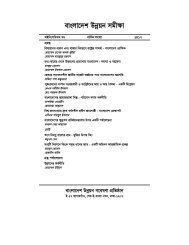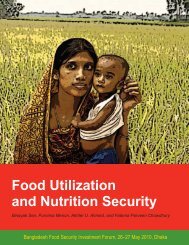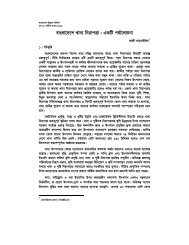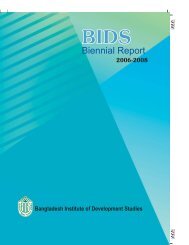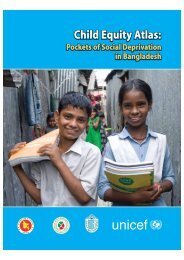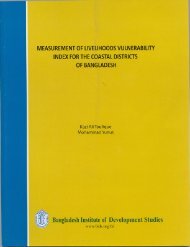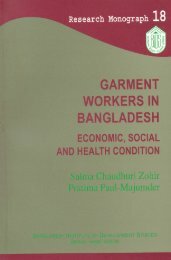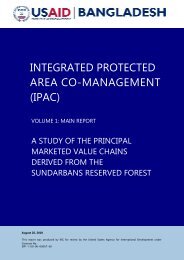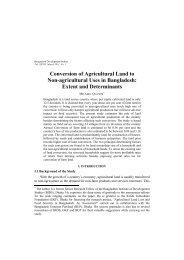2009-2010 - BIDS
2009-2010 - BIDS
2009-2010 - BIDS
Create successful ePaper yourself
Turn your PDF publications into a flip-book with our unique Google optimized e-Paper software.
deal with violence. It emerged during discussion<br />
that to combat violence against women was a<br />
major stumbling block to achieve gender equality<br />
and empowerment of women, and there was a<br />
need for a reliable database for collecting regular<br />
information about the intensity of the problem<br />
in which all stakeholders should participate. The<br />
project was completed in November <strong>2009</strong> and M.A.<br />
Mannan was the Project Director.<br />
Integration of Population and Gender Concerns<br />
into the National and Sectoral Policies and<br />
Strategies: Current Status and Constraints<br />
The study examines the extent of integration of<br />
population and gender concerns into the national<br />
and sectoral policies, programs and strategies<br />
and identifies barriers and constraints in these<br />
regards. The study has been prepared based on<br />
review of various national and sectoral policy<br />
documents, strategies and plan documents, and<br />
through gathering primary information from<br />
policy-makers, planners, field level officials and<br />
different stakeholders at local level. The study<br />
notes that integration of both the issues into<br />
different sectoral activities remains insufficient<br />
with population concerns. A major constraint<br />
in the integration process is the lack of<br />
coordination and monitoring of the process.<br />
Also, there systemic inefficiencies for this<br />
including lack of awareness among<br />
officials about gender and population<br />
issues, shortage of skilled manpower,<br />
inadequate sectoral policies,<br />
inadequate design of the projects/<br />
programs, lack of resources, and<br />
others. Sharifa Begum was the<br />
Project Director.<br />
by the government machineries. Utilizing<br />
both secondary and primary information, the<br />
study observes that Bangladesh is yet behind<br />
in implementing the CEDAW. Also, there are<br />
weaknesses and gaps in prevalent legal provisions<br />
which deprive women from justice. Sharifa Begum<br />
was the Project Director and co-researchers<br />
included Advocate Salma Ali, Mr Osman Ali and<br />
Harunur Rashid Bhuyan.<br />
Natural Resources Management<br />
and Climate Change<br />
A Study of the Principal Marketed Value Chains<br />
Derived from the Sundarbans Reserved Forest<br />
The study investigates aspects related to<br />
economics of resource extraction of twelve<br />
Sunderbans reserve forest products. The main actors<br />
in the value chains associated with the resource<br />
extraction are harvesters, beparis, farias, choto<br />
mahajans, boro mahajans, aratdars, wholesalers<br />
and retailers.<br />
A Review to Identify<br />
Legal Provisions that are<br />
Inconsistent with CEDAW in<br />
Bangladesh<br />
The study reviews the<br />
implementation of CEDAW<br />
provision in Bangladesh using<br />
general legal framework within<br />
which the legal rights are protected<br />
18<br />
<strong>BIDS</strong> Biennial Report <strong>2009</strong>-<strong>2010</strong>



